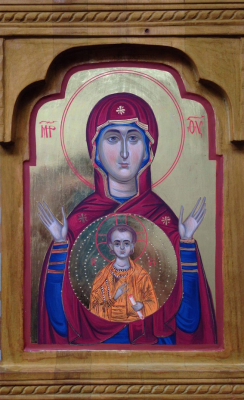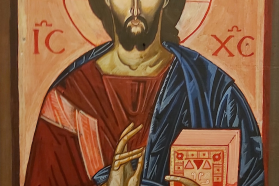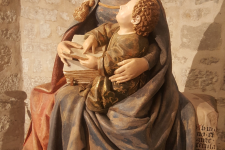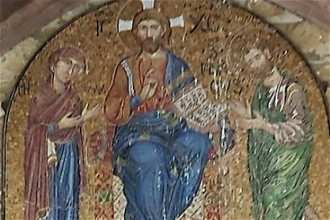Sunday Reflection with Canon Robin Gibbons - 14th February 2021

Icon by Fr Dobromir Dimitrov
Sixth Sunday in Ordinary Time
Two of the things I like about Jesus, are his lack of false modesty and also a pragmatic approach to the religious events in his life. In the tale of the healed Leper in Mark 1:40-45, Jesus is eminently straightforward, his compassion for the man is stated quite directly; he is 'moved with pity', he heals the leper but then with a 'stern' a warning , reminds him to fulfill all the ritual and legal requirements in order that he may take his rightful place back in society, but not to dramatize (at least this is my insight into that confrontation) what has taken place. Human nature being as it always is, the man can't keep his mouth shut and publicizes the healing everywhere.
Can we blame him?
Probably not, there are numbers of Christian groups who spend their time proclaiming and explaining the healing of their members in great detail, miracles are not hidden in many of our traditions, they are broadcast abroad as proof of the goodness and mercy of the Most High, and attributed to the intercession of some saint or another.
All to the good?
Maybe you think it good, but I have reservations about broadcasting such things, that they take place I have no problem believing, but does it do anything for my faith in God? Not really, its an extra, for me the real miracle is something to do with the imperceptible working of peoples hearts and attitudes, the shape shifting of the Holy Spirit calling us to cooperate in changing things for the better, for the good.
But back to our leper! The background to his condition and what it meant for his place in religion and public life is clear in the demands of Leviticus, there was a clearly defined pathway to 'define somebody as a leper'; there had to be a diagnosis, it is well to remember that although we define leprosy as Hansen's Disease, in the past any bad skin condition had leprosy associated with it. So once noted the authorities pronounced the person as 'unclean' and three conditions had to be met, first a frequent and very public acknowledgement of uncleanness, actually crying out, 'unclean unclean!' Secondly wearing unkempt and torn clothes, thirdly having unkempt, loose hair. All these prescriptions made the person 'unclean,' living outside the boundaries of normality. In the Mosaic Law it was the priest who made the diagnosis and declared a person an outcast and 'unclean'!
Suddenly a whole new dimension opens up for our understanding of this encounter. Jesus is an observant Jew, ritually clean, living in society, this leper crosses the boundaries, approaches him in what we can sense is a very bold or desperate move which also threatens Jesus' own status, for by touching him the leper draws Jesus into his own ritual uncleanness, the untouchable breaks through the barriers placed there to keep him out. This miracle is more than it seems, for it also goes right to the heart of our own trust and love of God, my own hesitancy about claiming the power of God for myself, to cast out sin and disease is bound up with the reaction of Jesus, for above all it is neither yours nor mine to demand or claim a divine prerogative of healing power, that is God's alone. In a reverse of the situation Jesus cleanses the man and then pragmatically (for he knows exactly what people are like) makes him follow the religious ritual and legal prescriptions for reintegration and proof of healing. This happens and the man r rejoins the community, whilst in a twist, being disobedient to the command to keep silent, Christ Jesus is now driven out by demands from others!
What can we take from this? A simple lesson I think, especially in this time of global pandemic. Jesus' stern warning not to go blabbing about his healing all over the place is connected to a deeper knowledge that an easier and dangerous route of people, is to build their faith on 'happenings' miracles as proof, healing as a sign of God's direct intervention and favour! Yet miracles are not the main point of the ministry and mission of Jesus and nor is it ours either, he came to proclaim the Good News, to open the Kingdom and offer salvation to ALL!
The real miracle is the Incarnation, life, death and Resurrection of Christ, who threw in his lot with us and remains amongst us in sign and symbol, in word and deed, in each other and in the smallest and least to show us Mercy is offered to all and Love will conquer all. And what of us? We are healed time and time again and do not know it, but in our turn, his disciples, we are not to seek fame through our religious belief, but to offer salvation as Christ's disciples. Lord, I am not worthy that you should enter under my roof, but only say the word and I shall be healed! Amen
Lectio
Pope Francis
Extract from Homily 15 02 15
In healing the leper, Jesus does not harm the healthy. Rather, he frees them from fear. He does not endanger them, but gives them a brother. He does not devalue the law but instead values those for whom God gave the law. Indeed, Jesus frees the healthy from the temptation of the "older brother" (cf. Lk 15:11-32), the burden of envy and the grumbling of the labourers who bore "the burden of the day and the heat" (cf. Mt 20:1-16).
In a word: charity cannot be neutral, antiseptic, indifferent, lukewarm or impartial! Charity is infectious, it excites, it risks and it engages! For true charity is always unmerited, unconditional and gratuitous! (cf. 1 Cor 13). Charity is creative in finding the right words to speak to all those considered incurable and hence untouchable. Finding the right words… Contact is the language of genuine communication, the same endearing language that brought healing to the leper. How many healings can we perform if only we learn this language of contact! The leper, once cured, became a messenger of God's love. The Gospel tells us that "he went out and began to proclaim it freely and to spread the word" (cf. Mk 1:45).
John Donne
Hymn to God, My God, in My Sickness
Since I am coming to that holy room,
Where, with thy choir of saints for evermore,
I shall be made thy music; as I come
I tune the instrument here at the door,
And what I must do then, think here before.
Whilst my physicians by their love are grown
Cosmographers, and I their map, who lie
Flat on this bed, that by them may be shown
That this is my south-west discovery,
Per fretum febris, by these straits to die,
I joy, that in these straits I see my west;
For, though their currents yield return to none,
What shall my west hurt me? As west and east
In all flat maps (and I am one) are one,
So death doth touch the resurrection.
Is the Pacific Sea my home? Or are
The eastern riches? Is Jerusalem?
Anyan, and Magellan, and Gibraltar,
All straits, and none but straits, are ways to them,
Whether where Japhet dwelt, or Cham, or Shem.
We think that Paradise and Calvary,
Christ's cross, and Adam's tree, stood in one place;
Look, Lord, and find both Adams met in me;
As the first Adam's sweat surrounds my face,
May the last Adam's blood my soul embrace.
So, in his purple wrapp'd, receive me, Lord;
By these his thorns, give me his other crown;
And as to others' souls I preach'd thy word,
Be this my text, my sermon to mine own:
"Therefore that he may raise, the Lord throws down."


















